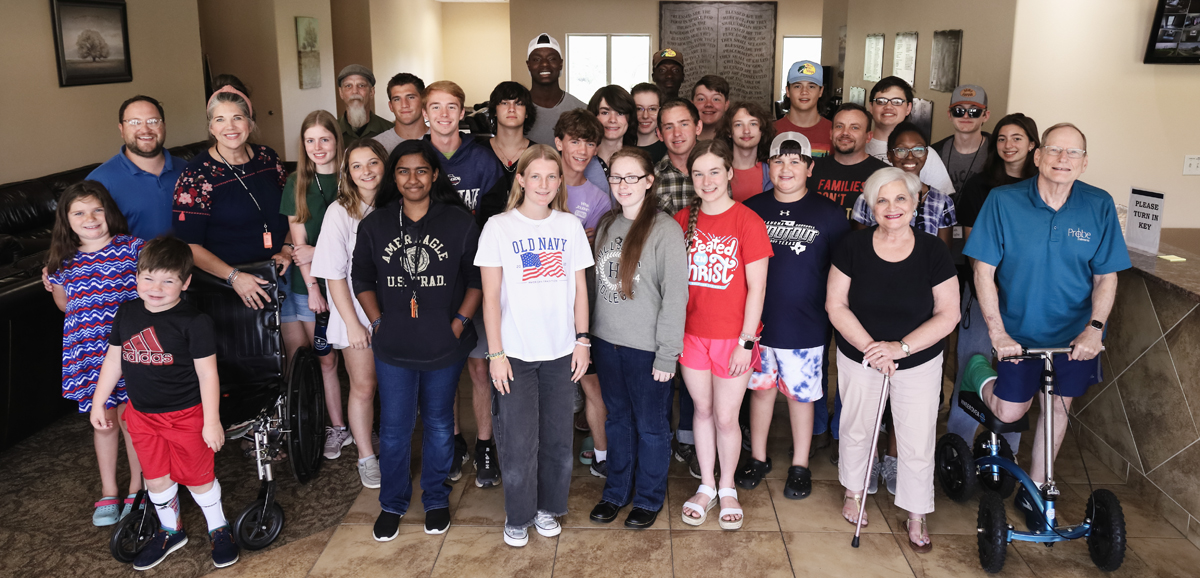 There’s one thing we do here at Probe that is my favorite part of ministry. Our Student Mind Games Camp is a week-long, total immersion, give-it-all-we’ve-got experience for high school and college students that changes minds and hearts forever.
There’s one thing we do here at Probe that is my favorite part of ministry. Our Student Mind Games Camp is a week-long, total immersion, give-it-all-we’ve-got experience for high school and college students that changes minds and hearts forever.
Beautiful Camp Copass in the Dallas-Ft. Worth area is surrounded by a lake on three sides and it feels very secluded—even though it’s not far from the Dallas-Ft. Worth airport, so students can easily fly in. We teach Christian students how to think biblically on a wide range of subjects: understanding how others think as they understand their worldviews, how they can know that Christianity is true, creation and evolution, human nature, the differences between guys and girls, the problem of evil and the value of suffering, campus Christianity, and even how to watch a movie with their brain turned on. They learn about Islam, a compassionate but biblical view of homosexuality, different views of science and Earth-history, and genetic engineering.
Returning campers get to experience what is always a highlight for our students, a special alumni track with new lectures in an intimate, personal setting. The alumni always tell the first-timers what an amazing difference it makes to come back a second or even third time, because they get so much more out of the conference than they ever thought possible.
The Probe teachers don’t just give the lectures, though; we continue conversations at meals where we eat and visit with the students instead of each other. We break up into discussion groups to help the students process what they’re learning in the sessions. There is free time every afternoon and evening to hike, swim, play basketball or card games, read or nap. Or of course, just hang out with new friends.
The students  are delighted to meet other thinking Christians from all over the country, students eager to think and grow in their faith as they learn to love God with their minds together. They enjoy getting to know us as the instructors, too. We’re not only available the whole week; we look for opportunities to engage in conversations that will encourage and affirm what God is doing in the minds and hearts of these precious young people.
are delighted to meet other thinking Christians from all over the country, students eager to think and grow in their faith as they learn to love God with their minds together. They enjoy getting to know us as the instructors, too. We’re not only available the whole week; we look for opportunities to engage in conversations that will encourage and affirm what God is doing in the minds and hearts of these precious young people.
We’ll be talking about Mind Games in this article, but you can go to our website, Probe.org/mindgames, and check out our videos, a typical week’s schedule, and lots of other information. In the next sections you’ll hear a little bit from several lecturers, and also from several of our Mind Games alumni.
Sneak Peek of Probe Lectures
Here are snippets from lectures of four of our Probe Mind Games instructors, speaking on the Biology of Human Uniqueness, LGBT, Islam, and Nietzsche for Beginners:
Dr. Ray Bohlin:
Fire is also necessary for creating tools, particularly metal tools. You have to be able to heat metals to a really high temperature: copper, silver, gold—all their melting temperatures are over a thousand degrees centigrade. So you have to get a really hot fire to do that, and to be able to make the tools liquid, to make them malleable. So you’ve got not only to be able to make a fire, you have to be intentional as to how you make a really hot fire.
Sue Bohlin:
What I really love is my title for this, which is “Grace and Truth About Homosexuality,” because I think we need both. We need to be coming from a heart of compassion and sympathy and understanding for the sexual and relational brokenness that results in homosexuality, but we also need to be absolutely camped out on the truth of the Word of God.
Paul Rutherford:
The third of the five pillars of Islam is the giving of alms, what they call zakat. It’s much similar to Christian charity, to giving to a church or giving to the poor; Muslims likewise have a heart for their community, have a heart for those who are down and out. This is the giving to “the least of these,” as Christians might call it. The fourth pillar of Islam is Ramadan, and Ramadan is a fast. It is a month-long fast. This is a time when they train themselves in discipline, of practicing not eating during the day, and when they train themselves in increasing their desire for God, for Allah.
Todd Kappelman:
Adolph Hitler, when he was coming to power after 1939, he ordered just crates and crates and crates of Thus Spake Zarathustra and would give to his captains and his commanders and everything, and we believe by this action in some of Hitler’s own words that he saw himself to be the inheritor of much of Nietzsche’s philosophy and especially the aspect of the overman, the great world historical figure that Nietzsche is going to advocate for solving some of the problems that he’s going to look at.
Comments from Alumni, Part 1
In this article we’re talking about our memorable, life-impacting, week-long summer Mind Games conference. But you don’t have to take our word for it. Consider what some of our alumni have to say.
Here’s three-time alumnus, Noah:
Mind Games is a fun place of fellowship, you get a lot of excitement, there’s a ropes course that you go on so there’s a lot of excitement there, you do a lot of team-building activities, it’s a ton of fun, you get to learn a whole lot about life, about faith, about people, about relationships. You get to experience a whole new world of things that you’ve never experienced before in the faith. A lot of people, they just have a surface-level faith, but here at Mind Games we go a whole lot deeper into that faith, we lay it out and we explain philosophically how it works, reasonably how it works, how it works with science, how it works with other people, how it works with suffering, how it works with everything, just how the world works with faith.
Here’s Esther:
My faith before Mind Games was a little crazy . . . I had thoughts about suicide a few times, and then I started to doubt, “Is God even there?” Like, if He was there, then wouldn’t I feel His presence? Then I came to Mind Games and I was like, there’s no way He’s not real. For someone who hasn’t been here, Mind Games is a great experience. You not only gain friends and family, but you learn more about God and how to stay stronger in your faith.
Tyler had a major shift between his first and second time at Mind Games:
I’m Tyler Lord from Athens, Georgia. Last year when I came I was actually agnostic, so I didn’t really know. But kinda having experiences throughout the year after Mind Games and coming back, I’ve become a Christian. It’s lots of fun. You come and, you know, it’s not really all about religion. There’s a bunch of free time you get to play around. You come in, and you don’t really know what to expect, When you get here and you think, oh, it’s gonna be a bunch of lectures, but it’s really not. You get a good bond with everybody’s who’s here, like the other campers. And even though there are lectures, they’re really interesting. The apologetics ones are great for like if someone comes up to you and they’re like, “Why are you a Christian?”
Comments From Alumni, Part 2
Here are a few more alumni comments, starting with Arty:
Mind Games is a wonderful time of fellowship, worship and just gaining a lot of knowledge into why Christianity is reasonable, how Christianity can work with science, how your faith and science can work together and not against each other. Mind Games is fun, it’s very much about the relationships that you build, it’s about the people who you interact with on a daily basis for the week.
This was Anya’s second time through:
After this second round of Mind Games, I feel like I’ve grown much more as a person, not just due to time but also how much Mind Games has affected me personally, If I had to describe Mind Games to someone who’s never been here before, I would say it’s something that completely blows your mind away. Not in the sense that it’s all weighing over your head, but just how much they describe, how much detail and information you have on how to defend your faith. First year it was amazing, and second year it got even better.
Ben also returned:
Well it’s really that the first Mind Games for me was like planting the seed, this time it’s nurturing the plant. It was really so I could re-establish what they had taught me last year, cause last year was such an eye-opener I wanted to see if either I could experience that or build upon it this year, which I have.
Amy set a record of coming to Mind Games!
My name is Amy Klaschus, I’m from Orlando Florida, and I’ve been to Mind Games five times now! What keeps me coming back to Mind Games is the people, because I love the teachers—they’re very nice and they’re always willing to help and answer questions. Every year there have been at least a few people among the students who are just so welcoming and so Christian in a way I can’t really find back home as much. I know that in shaping my growth in faith, Mind Games has been just completely essential, because it’s given me the perspective and the ability to think biblically about all the problems I face, all the problems I faced in high school and now all the problems I’ve been facing this past year of college.
Why Go to Mind Games?
We now know that three out of four high school seniors who had been part of a church youth group drop out of church within a year.{1} One reason for this is that they don’t own their faith; they don’t know that Christianity is true, and they don’t know why it’s true. They tend to equate faith with a warm fuzzy feeling that doesn’t stand up to the challenges of life. Many students are afraid to express their doubts so they never learn that there are good, solid answers to their questions. They are sensitive to the disconnect that happens when those who profess to be Christ-followers act no differently from unbelievers.
For over twenty years, Probe’s Mind Games conferences have been preparing young people for the challenges to their faith. In that time, we have witnessed firsthand the incredible thirst for a reliable trustworthy faith. Again and again we hear that some had despaired of ever finding something like Mind Games. The conference consistently exceeds expectations, and students often tell us they wish they had brought their friends.
Alumni from these summer conferences have gone on to become leaders on their campuses, the government and the military. This week-long immersion truly changes lives, giving them a new confidence in their God, His Word, and in their role as His ambassadors. We know this because some of them come back as alumni a second or third year, and because they contact us years later and let us know how Mind Games continues to impact them.
Mornings start with an informal devotional by Probe staff and a time of prayer. They receive twenty-five hours of lecture using video clips, role play, Q and A, and other teaching techniques. They connect with each other and process what they’re learning in small groups. We as staff get to know and truly love them.
The Student Mind Games Camp is for those who have finished their junior or senior years of high school, and for college freshmen and sophomores. [Note: especially motivated students younger than that are welcome, though!] Please go to our Web site, Probe.org/mindgames, and check out videos. You can look at a typical schedule, and find out all the details. And then register someone you love. It will make a difference in time and eternity.
Note
1. Steve Cable, Is This the Last Christian Generation? probe.org/is-this-the-last-christian-generation/
©2018 Probe Ministries



